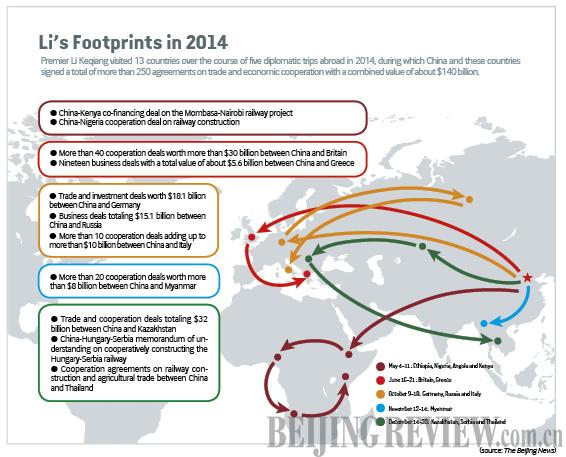|
Pornchai Trakulwaranont, Deputy Director for Administration of Thailand's renowned Thammasat University, said that of all the fields of GMS cooperation, infrastructure has seen the greatest achievements over the past two decades. He hopes the China-led Asian Infrastructure Investment Bank will serve as a more secure source of financial support for infrastructure development in the region.
While benefiting regional countries, observers believe the China-Thailand railway deal will serve as a model of the bulk export of China's core technology and equipment to Southeast Asia and South Asia.
Moreover, once the new railway reaches the Gulf of Thailand, it will offer new routes for China's marine logistics to directly enter the Indian Ocean. On a broader scale, the GMS economic cooperation, with a total trade volume of $150 billion in 2013, will further enrich China's partnership with the Association of Southeast Asian Nations.
Benefiting neighbors
Besides the railway deal, Li also announced a large amount of aid for regional countries during the GMS summit. The details of the offer include $1 billion for infrastructure interconnectivity, $490 million in grants for poverty alleviation and $10 billion in special loans. China also promised to invest $16.4 million in dredging waterways along the Mekong River and preventing natural disasters.
Su Xiaohui, Deputy Director of the Department of International and Strategic Studies at the China Institute of International Studies, held that China's generosity during the GMS summit fully demonstrates its good-neighborliness diplomacy featuring closeness, sincerity, sharing and inclusiveness.
"On the basis of reciprocity and mutual benefit, China is weaving a closer network of common interests with its neighbors through concrete cooperation and aid, striving to upgrade their common interests to a new high," Su said.
Though first initiated by the Asian Development Bank, China's role in promoting the GMS cooperation is apparently on the rise in recent years with its rapid economic growth. The past two decades have witnessed a flurry of China-backed initiatives on promoting GMS cooperation, which now covers 10 fields: transportation, energy, agriculture, environmental protection, human resources, urbanization, tourism, trade facilitation, information and transnational economic cooperation.
The latest GMS summit, under the theme of Committed to Inclusive and Sustainable Development in the GMS, has provided a strong impetus for the sub-regional cooperation by identifying 92 priority investment projects and passing an investment framework plan from 2014 to 2018 totaling $30 billion.
Song said that with a record high investment volume, the plan has proposed a comprehensive blueprint that will provide momentum to the inclusive and sustainable development of GMS. China, as the biggest country with rich experience for economic development, will continue to play the leading role for the sub-regional cooperation, he added.
In addition to economic cooperation and assistance, China has also strengthened security cooperation with GMS countries in recent years. It is spearheading concerted efforts to maintain peace and security in the Asian sub-region that is currently plagued by an array of transnational crimes such as drug smuggling and human trafficking. Following the killing of 13 Chinese sailors in the opium-producing Golden Triangle in 2011, China has initiated and conducted regular joint patrols with Laos, Myanmar and Thailand on the Mekong River to secure safety along the busy trading route.
Email us at: yulintao@bjreview.com

| 